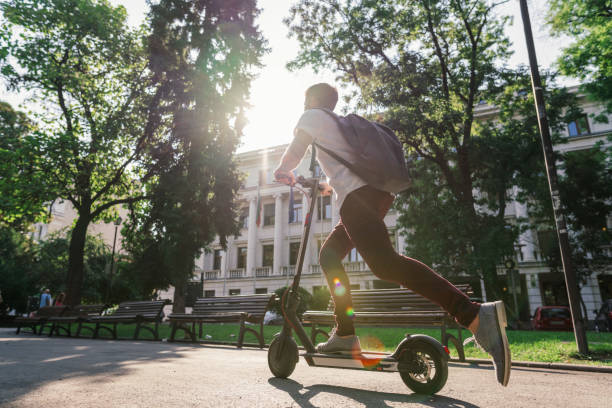Electric scooters have become a popular mode of transportation in recent years, especially in urban areas. They are eco-friendly, affordable, and convenient, making them an attractive option for short-distance travel. However, what many people may not realize is that the technology used in electric scooters is rapidly changing the way we travel.
With advancements in technology, electric scooters are becoming smarter, safer, and more efficient. For example, some electric scooters now come equipped with sensors that allow them to detect obstacles and adjust their speed accordingly. Others have GPS tracking, making it easier for riders to locate and rent them. Additionally, some companies are experimenting with self-driving electric scooters that can drive themselves to a safe parking space or charging station after use.
These technological advancements in electric scooters are not only changing the way we travel but also have the potential to revolutionize the transportation industry as a whole. As more people turn to electric scooters for their daily commute, cities may need to adapt their infrastructure to accommodate this new mode of transportation. Furthermore, electric scooters could play a significant role in reducing carbon emissions and improving air quality in urban areas.
The Advancements in Electric Scooter Technology
Battery Technology
One of the most significant advancements in electric scooter technology is the development of better battery technology. Lithium-ion batteries have replaced the heavier and less efficient lead-acid batteries, allowing for longer ranges and faster charging times. Some electric scooters now have removable batteries, making it easier to charge them on the go.
The development of swappable batteries has also been a game-changer for scooter-sharing companies. Instead of taking the entire scooter to a charging station, operators can simply swap out the battery and continue to rent out the scooter. This reduces downtime and increases the availability of scooters for riders.
Motor Technology
Electric scooter motors have also seen significant advancements in recent years. Brushless DC motors are now the standard, providing more power and better efficiency than their brushed counterparts. These motors are also quieter and require less maintenance.
Some electric scooters now have multiple motors, providing more power and better acceleration. Dual-motor scooters are becoming more popular, especially for off-road and high-performance models.
Smart Features
Electric scooters are also becoming smarter, with features like GPS tracking, app integration, and built-in safety features. GPS tracking allows riders to locate and rent scooters through their smartphones, while app integration provides real-time information about battery life, speed, and distance traveled.
Built-in safety features like headlights, taillights, and brake lights make electric scooters safer to ride, especially at night. Some scooters also have sensors that detect obstacles and adjust the speed accordingly, reducing the risk of accidents.
The Impact on Urban Transportation
Reduced Carbon Footprint
Electric scooters are eco-friendly and emit zero to minimal greenhouse gases, making them an ideal mode of transportation for environmentally conscious individuals. According to a study by the North Carolina State University, electric scooters have the potential to reduce carbon dioxide emissions by up to 80% compared to cars.
By using electric scooters, people can significantly reduce their carbon footprint and contribute to a cleaner environment. This is especially important in urban areas, where air pollution is a major concern and a leading cause of respiratory illnesses.
Increased Convenience and Accessibility
Electric scooters are changing the way people move around in cities. They provide a convenient and affordable mode of transportation for short distances, making them an excellent option for last-mile connectivity. People can easily rent electric scooters using their smartphones and ride them to their destination without worrying about parking or traffic congestion.
Electric scooters are also accessible to a wide range of people, including those who cannot afford to own a car or those who have mobility issues. They are lightweight and easy to maneuver, making them a great option for people who need to travel short distances quickly.
Improved Safety
Electric scooters are equipped with advanced safety features that make them safer than traditional scooters or bicycles. They have a low center of gravity, which makes them more stable and less prone to accidents. They also have anti-lock brakes, which can prevent skidding and improve stopping distance.
Moreover, electric scooters are equipped with LED lights and reflectors, making them visible to other road users. This reduces the risk of accidents, especially at night or in low-light conditions. Additionally, electric scooters are designed to limit their speed, ensuring that riders do not exceed safe speeds and reducing the risk of accidents.
The Future of Electric Scooter Technology
As the popularity of electric scooters continues to grow, technology is playing a crucial role in shaping the future of this mode of transportation. Here are some of the ways that technology is changing the game:
Integration with Public Transportation
One of the biggest advantages of electric scooters is their portability, which makes them an ideal option for last-mile transportation. In the future, electric scooters are likely to become even more integrated with public transportation systems, allowing riders to seamlessly transition from a train or bus to a scooter for the final leg of their journey. This could involve dedicated scooter parking spaces at transit stations, as well as partnerships between scooter companies and public transportation providers.
Advancements in Battery Technology
Battery technology is a key area of focus for electric scooter manufacturers, as longer battery life means greater range and more convenience for riders. In the future, we can expect to see continued advancements in battery technology, including faster charging times, longer battery life, and improved safety features.
In addition, some companies are exploring the use of swappable batteries, which would allow riders to quickly and easily exchange a depleted battery for a fully charged one at designated locations. This could help to address one of the biggest challenges facing electric scooters: the need to recharge frequently.
Expansion to Rural Areas
Electric scooters are currently most popular in urban areas, where they provide a convenient and eco-friendly alternative to cars and public transportation. However, as technology continues to improve, electric scooters may become a viable option for rural areas as well.
One potential solution is the use of all-terrain electric scooters, which are designed to handle rough terrain and uneven surfaces. These could be used for a variety of purposes, from commuting to work on rural roads to exploring off-road trails and parks.
Overall, the future of electric scooter technology looks bright, with continued advances in battery technology, integration with public transportation, and new applications in rural areas. As these innovations continue to unfold, electric scooters are likely to become an even more popular and versatile mode of transportation.
Conclusion
Electric scooters are changing the way we travel. They are becoming increasingly popular as people seek an eco-friendly, efficient, and affordable mode of transportation. The technology used in electric scooters is constantly evolving, and this is making them even more attractive to users.
One of the key benefits of electric scooters is their low environmental impact. They produce zero emissions, making them an ideal choice for urban areas where air pollution is a major concern. They are also very efficient, requiring far less energy than traditional vehicles. This means that they are not only good for the environment but also for the user’s wallet.
Another advantage of electric scooters is their convenience. They are small and lightweight, making them easy to park and store. They are also very maneuverable, allowing users to navigate through traffic with ease. This makes them an ideal choice for short trips around town.
However, electric scooters are not without their challenges. Safety is a major concern, and users must take precautions to avoid accidents. They must also be aware of local regulations regarding the use of electric scooters.
Overall, electric scooters are a promising technology that is changing the way we travel. As the technology continues to evolve, we can expect to see even more benefits and improvements in the future.





